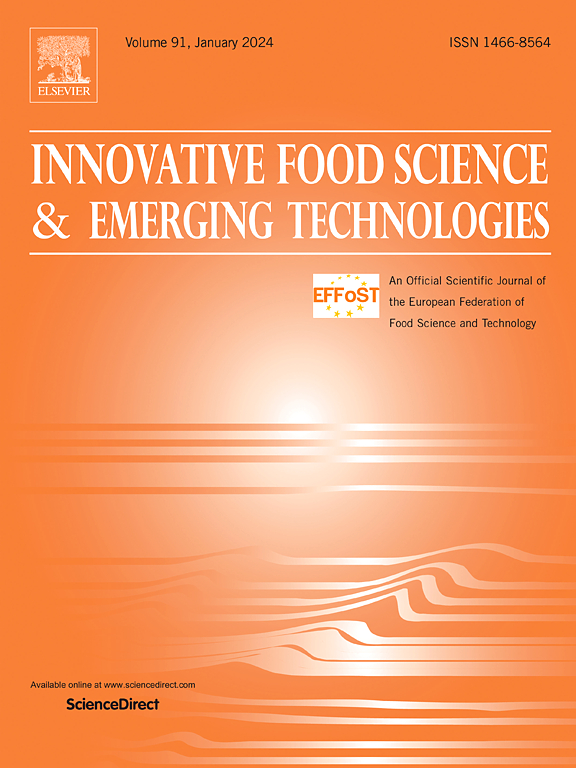Impact of storage temperature on the physicochemical properties and stability of oil-in-water emulsions under subzero isochoric cooling and conventional isobaric freezing
IF 6.8
1区 农林科学
Q1 FOOD SCIENCE & TECHNOLOGY
Innovative Food Science & Emerging Technologies
Pub Date : 2025-07-23
DOI:10.1016/j.ifset.2025.104129
引用次数: 0
Abstract
This study examined the impact of subzero isochoric cooling (ICC) on the stability and physicochemical properties of oil-in-water (o/w) emulsions with 10 % and 20 % oil content during storage. Emulsions were treated with ICC (−18 °C/170 MPa) or conventional isobaric freezing (IBF; −18 °C/0.1 MPa) for 7 days and then stored at 4 °C and 22 °C. Untreated control emulsions were also stored for comparison. Microbiological quality (total aerobic microorganisms, yeast, mold), droplet size, viscosity, zeta potential, microstructure, color, and stability were evaluated.
ICC-treated emulsions remained free of detectable microorganisms for up to 12 weeks at 4 °C, regardless of oil content. At 22 °C, microbial levels were undetectable for 12 weeks in 10 % oil emulsions and 4 weeks in 20 % emulsions. In contrast, microbial counts in control and IBF emulsions exceeded 8 log CFU/mL after just 2–4 weeks of storage. IBF also led to increased droplet size, viscosity, and yellowness, indicating emulsion instability during freeze-thaw cycles.
ICC-treated emulsions exhibited stable physicochemical properties throughout storage, with minimal changes in droplet size, viscosity, and color. These findings highlight ICC's potential to enhance the shelf-life, safety, and quality of emulsified food products, outperforming conventional freezing methods. Overall, ICC at −18 °C/170 MPa offers a promising alternative to traditional freezing, especially for o/w emulsions. Emulsions with 10 % oil remained stable for up to 12 weeks at both storage temperatures, while 20 % oil emulsions maintained stability for 12 weeks at 4 °C and 4 weeks at 22 °C.
低温等压冷却和常规等压冷冻对水包油乳状液理化性质和稳定性的影响
本研究考察了低温等时冷却(ICC)对含油量为10%和20%的水包油(o/w)乳状液在贮存过程中的稳定性和理化性质的影响。乳剂采用ICC(- 18°C/170 MPa)或常规等压冷冻(IBF;- 18°C/0.1 MPa)保存7天,然后在4°C和22°C保存。未处理的对照乳剂也保存起来进行比较。微生物质量(总需氧微生物,酵母,霉菌),液滴大小,粘度,zeta电位,微观结构,颜色和稳定性进行了评估。无论含油量如何,icc处理的乳剂在4°C下可保持12周无可检测到的微生物。在22°C条件下,10%油乳剂和20%油乳剂分别在12周和4周内检测不到微生物水平。相比之下,对照组和IBF乳剂在储存2-4周后,微生物计数超过8 log CFU/mL。IBF还导致液滴尺寸、粘度和黄度增加,表明在冻融循环过程中乳液不稳定。icc处理的乳剂在整个储存过程中表现出稳定的物理化学性质,液滴大小、粘度和颜色的变化很小。这些发现突出了ICC在提高乳化食品的保质期、安全性和质量方面的潜力,优于传统的冷冻方法。总的来说,−18°C/170 MPa的ICC为传统冷冻提供了一种很有前途的选择,特别是对于0 /w乳液。含10%油的乳剂在两种储存温度下都能保持稳定长达12周,而含20%油的乳剂在4°C和22°C下分别能保持12周和4周的稳定性。
本文章由计算机程序翻译,如有差异,请以英文原文为准。
求助全文
约1分钟内获得全文
求助全文
来源期刊
CiteScore
12.00
自引率
6.10%
发文量
259
审稿时长
25 days
期刊介绍:
Innovative Food Science and Emerging Technologies (IFSET) aims to provide the highest quality original contributions and few, mainly upon invitation, reviews on and highly innovative developments in food science and emerging food process technologies. The significance of the results either for the science community or for industrial R&D groups must be specified. Papers submitted must be of highest scientific quality and only those advancing current scientific knowledge and understanding or with technical relevance will be considered.

 求助内容:
求助内容: 应助结果提醒方式:
应助结果提醒方式:


